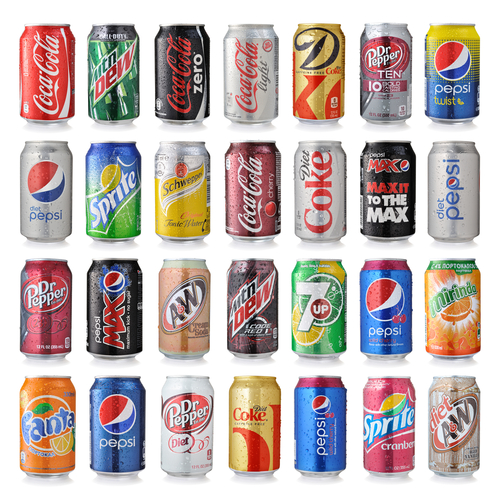Several foods have been associated with promoting inflammation in the body. While the response to these foods can vary from person to person, some common culprits often linked to dietary inflammation include:
Processed and refined carbohydrates: Foods like white bread, pastries, sugary drinks, and processed snacks can cause a spike in blood sugar levels and trigger inflammation.
Sugar and high-fructose corn syrup: Excessive sugar consumption, especially in the form of added sugars found in desserts, sodas, and processed foods, has been linked to increased inflammation. Look on food labels for;
- Granulated sugar
- Brown sugar
- Confectioner’s sugar
- High-fructose corn syrup
- Corn syrup
- Agave syrup
- Honey (consume in moderation)
Saturated and trans fats: These unhealthy fats are commonly found in fried foods, processed meats, high-fat dairy products, and commercially baked goods. They can contribute to inflammation and raise the risk of chronic diseases. Look on food labels for;
- Butter
- Lard
- Palm oil
- Coconut oil (high in saturated fat, use in moderation)
- Shortening
- Margarine (containing trans fats)
- Hydrogenated or partially hydrogenated oils (trans fats)
Vegetable oils: Certain vegetable oils like soybean oil, corn oil, and sunflower oil are high in omega-6 fatty acids. While omega-6 fatty acids are essential, an imbalance between omega-6 and omega-3 fatty acids (found in fish, walnuts, and flaxseeds) can promote inflammation.
Red and processed meats: Consumption of red meat and processed meats like bacon, sausages, and hot dogs has been associated with increased inflammation and a higher risk of chronic diseases.
Alcohol: Excessive alcohol intake can lead to inflammation in various organs, particularly the liver. It can also impair the body’s ability to regulate inflammation.
Artificial additives: Certain food additives like artificial sweeteners, preservatives, and colourings may trigger inflammation in some individuals. Examples include aspartame, monosodium glutamate (MSG), and artificial food colourings. Look on food labels for;
- Aspartame (artificial sweetener)
- Saccharin (artificial sweetener)
- Monosodium glutamate (MSG)
- Artificial food colorings (identified by their specific names or numbers, such as Red 40, Yellow 5, Blue 1)
- Sodium nitrite and sodium nitrate (commonly found in processed meats)
- BHA (butylated hydroxyanisole) and BHT (butylated hydroxytoluene) (preservatives)
It’s important to note that while these foods are commonly associated with promoting inflammation, the effects can vary from person to person. Additionally, a healthy diet is not solely about avoiding inflammatory foods but also about consuming a variety of whole foods like fruits, vegetables, whole grains, lean proteins, and healthy fats that have anti-inflammatory properties. Consult with a healthcare professional or a registered dietitian for personalised dietary recommendations to manage or reduce inflammation in your body.
If you suspect that inflammation is affecting your weight loss efforts, here are some easy tips to help manage inflammation:
Emphasise whole foods: Focus on consuming a variety of whole, unprocessed foods such as fruits, vegetables, whole grains, lean proteins, and healthy fats. These foods are rich in nutrients and antioxidants, which can help reduce inflammation in the body.
Incorporate anti-inflammatory foods: Include foods with anti-inflammatory properties in your diet, such as fatty fish (salmon, mackerel), walnuts, flaxseeds, olive oil, turmeric, ginger, leafy greens, and colorful fruits and vegetables. These foods contain compounds that can help combat inflammation.
Limit processed foods and refined sugars: Minimise your consumption of processed and refined foods, including sugary snacks, desserts, sodas, and processed meats. These foods can promote inflammation and hinder weight loss efforts.
Choose healthy fats: Opt for healthy fats like avocados, nuts, seeds, and extra virgin olive oil, which are rich in omega-3 fatty acids and can help reduce inflammation. Avoid or limit foods high in saturated fats and trans fats.
Be mindful of portion sizes: Pay attention to your portion sizes to avoid overeating. Even healthy foods can contribute to weight gain if consumed in excessive amounts. If portion sizes are a known problem, bear in mind home made versions of processed meals will allow for larger portion sizes and contain more nutrients.
Stay hydrated: Drink plenty of water throughout the day to support overall health and hydration. Water helps flush out toxins and can aid in reducing inflammation.
Get regular exercise: Engage in regular physical activity to help manage inflammation and support weight loss. Exercise has anti-inflammatory effects and can help burn calories, improve insulin sensitivity, and promote overall well-being.
Manage stress levels: Chronic stress can contribute to inflammation. Incorporate stress management techniques such as meditation, deep breathing exercises, yoga, or engaging in activities you enjoy to help reduce stress and promote overall health.
Prioritise sleep: Aim for quality sleep of 7-9 hours per night. Sufficient sleep supports a healthy immune system and helps regulate hormones involved in appetite control and inflammation.
Incorporate anti-inflammatory herbs and spices: Add herbs and spices known for their anti-inflammatory properties to your meals. Turmeric, ginger, cinnamon, garlic, and oregano are examples of flavorful ingredients that can help reduce inflammation. Sprinkle them on your dishes, include them in marinades or dressings, or enjoy them in herbal teas to boost your anti-inflammatory intake.
Although dietary inflammation can pose challenges to weight loss efforts, it can be managed effectively through mindful dietary choices. Prioritising whole foods and incorporating anti-inflammatory options like fatty fish, nuts, and colourful fruits and vegetables can help combat inflammation and support weight loss. Avoiding processed foods, refined sugars, and unhealthy fats is crucial in reducing inflammation and promoting a healthy weight. Portion control, proper hydration, regular exercise, and stress management techniques are also essential for managing inflammation and optimising weight loss. By adopting a holistic approach and making informed choices, individuals can successfully manage dietary inflammation, support their weight loss goals, and improve overall well-being


